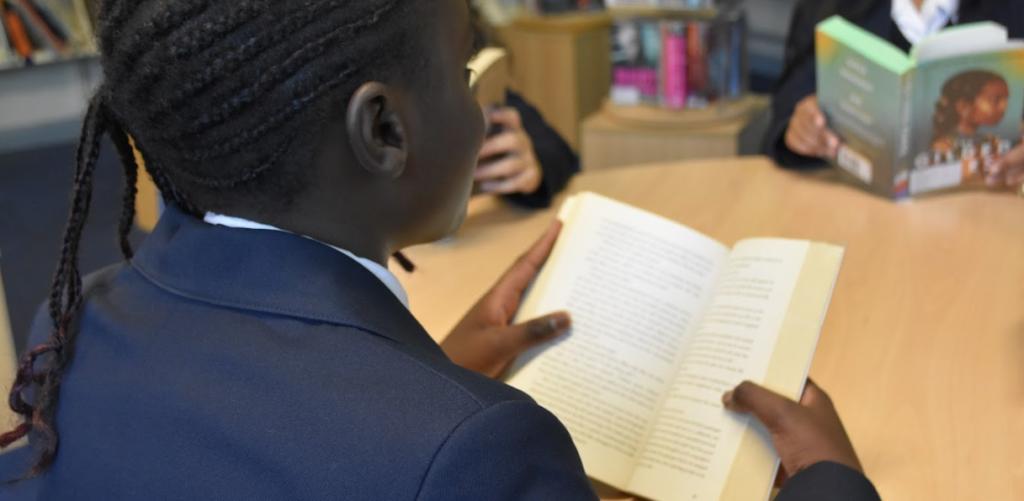At A-level, students are assessed through two examinations at the end of Year 13, as well as the non-examination assessment (NEA), or coursework.
For Paper 1, entitled ‘Love Through the Ages’, students will read Shakespeare’s ‘Othello’, exploring key characters, themes and messages and relating the play to its social, cultural and historical context, as well as Fitzgerald’s ‘The Great Gatsby’ and the AQA anthology of A-level love poetry. Students link and compare Fitzgerald’s classic novel with various poems that they have studied, commenting on differing representations of love. In addition to these set texts, students are expected to independently read a wide range of fiction and non-fiction texts, linked in some way to the literature that they have studied; a key skill assessed at A-level is the ability to link set texts to other works of literature throughout history. Students also compare two unseen love poems for the final component of this examination.
Paper 2 (Option B), entitled ‘Texts in Shared Contexts: Modern Times – Literature from 1945 to the present day’, requires students to read and critically analyse Carol Ann Duffy’s ‘Feminine Gospels’ collection of poems, before exploring an unseen extract from twentieth or twenty-first century prose and comparing Tennessee Williams’ famous play ‘A Streetcar Named Desire’ with Alice Walker’s epistolary novel ‘The Color Purple’. Key themes that are discussed, throughout all of the A-level set texts, include patriarchy, misogyny, gender inequality, social class and mental illness.
The NEA (coursework) is an independent critical study of texts across time. Students must produce one extended essay (2,500 words), a piece of comparative critical analysis of two texts, at least one of which must have been written pre-1900. Teachers will provide some guidance and support as to appropriate texts – and ‘The Yellow Wallpaper’, by Charlotte Perkins Gilman, is recommended to all students as its themes and messages link strongly to several powerful works of literature from the twentieth and twenty-first centuries.
Year 12
Autumn Term
Teacher A: ‘The Great Gatsby’ (Paper 1 Section C)
Students cover the key social and historical context, plot, characters and key themes for both Fitzgerald’s ‘The Great Gatsby’ and Shakespeare’s ‘Othello’.
Teacher B: ‘Othello’ (Paper 1 Section A)
For Fitzgerald’s novel, students focus on representations of love, whilst their study of ‘Othello’ centres on extracts taken from various points in the play, with an emphasis on how characters and themes are portrayed.
Spring Term
Teacher A: Pre-1900 love poetry anthology (Paper 1 Section C)
Having studied ‘The Great Gatsby’, students now explore the AQA anthology of love poetry, with a view to finding poems that can be thematically linked and compared, in some way, to Fitzgerald’s novel.
Teacher B: Comparing unseen love poetry (Paper 1 Section B)
Students will also begin to explore Section B of Paper 1, reading, discussing, analysing and comparing various pairs of previously unseen love poems.
Summer Term
Teacher A: An introduction to the NEA (independent critical study)
In the summer term, students revise Paper 1 (‘Othello’, ‘The Great Gatsby’, the anthology poems and unseen poetry), before being introduced to the NEA (coursework) task.
Teacher B: Carol Ann Duffy’s ‘Feminine Gospels’
Meanwhile, with their second teacher, students begin to read, explore and debate the messages of Carol Ann Duffy’s explosive, emotive and compelling collection, ‘Feminine Gospels’.
Year 13
Autumn Term
Teacher A: NEA (coursework) support and unseen modern prose (Paper 2B Section B)
Students continue to work on drafting and finalising their non-examination assessment (coursework), whilst also exploring a range of extracts from modern (twentieth and twenty-first century) prose, in preparation for Section B of Paper 2 (Texts in Shared Contexts).
Teacher B: ‘A Streetcar Named Desire’ and ‘The Color Purple’
Students will also research the social, cultural and historical context of both Williams’ play ‘A Streetcar Named Desire’ and Walker’s novel ‘The Color Purple’, before reading each texts and exploring the various themes – such as isolation, misogyny and social inequality – that they share.
Spring Term
Teacher A: Revision of ‘The Great Gatsby’ and the anthology of love poetry
In the Spring term, with all set texts and key content covered, students begin to revise Paper 1.
Teacher B: Revision of ‘Othello’ and unseen poetry
They revisit ‘The Great Gatsby’, linking its themes and ideas with the anthology poems, as well as revising the key plot, themes and messages of ‘Othello’ and practising comparative analysis of unseen poetry.
Summer Term
Teacher A: Revision of unseen modern prose and examination technique
In the Summer term, students revisit content from all papers, to the discretion of the class teacher. Initially there will be an emphasis on revisiting Paper 2B (‘Feminine Gospels’, unseen modern prose and the comparative analysis of ‘A Streetcar Named Desire’ and ‘The Color Purple’) but there will also be an opportunity to revise all sections of Paper 1 (‘Love Through the Ages’).
Teacher B: Revision of ‘Feminine Gospels’, ‘A Streetcar Named Desire’
In addition to revision materials shared in lessons, students will have several opportunities to practise their responses to exam questions in timed conditions, to ensure that they have the chance to fine-tune their examination technique.
Assessment at Key stage 5
As at Key Stages 3 and 4, summative assessments at Key Stage 5 occur each half-term. For A level students, however, they will sit two such assessments per half-term instead of one, since they have two teachers covering different aspects of the course. For example, in the first half-term of Year 12, students will write one critical essay about Fitzgerald’s ‘The Great Gatsby’ and another (their second assessment) about Shakespeare’s ‘Othello’.
For A-level English Literature, there are no external examinations in Year 12: the course is assessed in its entirety at the end of Year 13, and this assessment falls into three sections: Paper 1 (40% of the A-level), Paper 2B (40% of the A-level) and the non-examination assessment (coursework – 20% of the A-level).
- Paper 1 (‘Love Through the Ages’): 3 hour written examination; three questions, each worth 25 marks – 1) ‘Othello’ (closed book, extract-based); 2) comparison of unseen poetry; 3) ‘The Great Gatsby’ and anthology of love poems (open book)
- Paper 2B (‘Texts in Shared Contexts: 1945 to the present day’): 2 hours 30 minutes – three questions, each worth 25 marks – 1) ‘Feminine Gospels’ by Carol Ann Duffy (open book); 2) Extract of unseen modern prose; 3) Comparison of ‘A Streetcar Named Desire’ and ‘The Color Purple’ (open book)
- Non-examination assessment (NEA)
How can parents help support their child’s learning?
All students who join the A-level English Literature course are expected to read widely, both for pleasure and to support their understanding of the set texts. A-level teachers provide students with a wider reading log at the start of the course, and it is important that students continue to read a range of texts – not only prose, poetry and drama but also non-fiction, such as critical academic essays – to link to the literature that they study in lessons.
AQA have produced an excellent guide to the A-level course – ‘A/AS Level English Literature A for AQA Student Book’ – and this would be a worthwhile investment to support students in their exploration and analysis of the set texts. In addition, York Notes have published revision guides for each of the set texts for A-level English Literature and, again, these would be valuable resources to any student requiring additional support.
Enrichment opportunities
Year 12 and Year 13 students play a leading role in the editing and publication of the official student magazine, ‘Loudspeaker’, meeting on a weekly basis to create artwork, write articles and edit pieces of writing submitted by students in lower year groups. This is an exciting and rewarding role, with Sixth Form students entrusted with the responsibility of helping to project the school’s collective student voice.
Trips are organised to aid A-level students’ understanding of the set texts, with students in previous years attending academic workshops on ‘Othello’, ‘The Great Gatsby’ and ‘A Streetcar Named Desire’, as well as a theatre production of the musical adaptation of Alice Walker’s ‘The Color Purple’.
Post 16 course/s (exam board and code)
AQA A-level English Literature A (7712)
![]()



